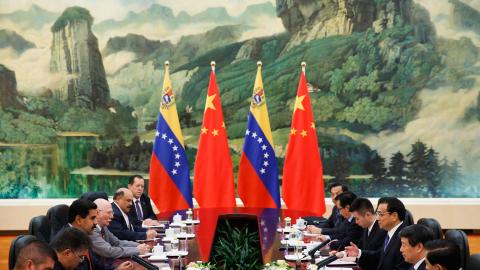President-elect Donald Trump on Wednesday tapped Florida senator Marco Rubio (R.) to lead the State Department. Rubio is, among other things, a full-spectrum opponent of China's nefarious activities, and the news of his nomination dismayed the soft-on-China crowd. He is also tough on Iran and should focus America's diplomats on promoting the nation's interests rather than exporting the culture wars. But Rubio's most distinctive foreign policy contribution is likely to be in Latin America, where he can bring the Monroe Doctrine back to the center of U.S. foreign policy.
America's benign neighborhood should be one of its great strategic advantages. German chancellor Otto von Bismarck is said to have quipped, "The Americans are a very lucky people. They're bordered to the north and south by weak neighbors, and to the east and west by fish."
Getting to that point took a lot of work. Ever since the French Revolution set off a global conflagration that ultimately doomed France's and Spain's American empires, Americans have feared hostile powers intervening to their south. The Monroe Doctrine was an attempt to, in quiet partnership with Great Britain, keep Latin America out of Europe's imperial games. Starting with Joel Roberts Poinsett, John Quincy Adams's minister to Mexico, the United States has tried to promote pro-American democratic groups in the region.
Driving out British and Russian rivals was a slog. Britain was the preeminent global power for the first century and a half after U.S. independence, and it pulled Latin America into its informal economic empire. For most of that period, British millworkers were some of Latin America's best customers, but American farmers were its biggest competitors. By the time British regional influence collapsed, the Soviet Union was ready to support Communist movements across the hemisphere. To win the Cold War in Latin America, the United States had to partner with some vicious dictators and pull the region into its own economic orbit.
After a few decades of relative calm, the situation in much of Latin America is deteriorating. Venezuela's socialist turn has predictably transformed the country with the world's largest proven oil reserves into a pauper state. Nearly eight million Venezuelans have fled their homeland, and this summer's sham election revealed that President Maduro will not relinquish power. The region generally struggles with low economic growth and high debt. Crime is a major problem in countries like Mexico, where gangs have set off a multiyear murder wave.
The United States also has a new great power rival in the region. China has become South America's largest trading partner, and it is making inroads across the Western Hemisphere. More than 20 Latin American countries have joined China's Belt and Road Initiative, and many are building their next-generation telecommunications networks with Huawei's equipment. These ties are not just economic: Brazil's left-leaning government invited Chinese troops to participate in the military drills in September, and Communist Cuba has hosted a Chinese spy base since at least 2019.
China's influence exacerbates the other issues that have plagued the region. The Belt and Road thrives off corrupt officials, and Chinese investors are making a killing off Mexican and Latin American fentanyl and human trafficking gangs. Despite her best efforts, President Joe Biden's border czar, Kamala Harris, failed to resolve the root issues that have plagued Central America for most of its two centuries of independence or, more achievably, protect America's southern border.
Rubio has extensive experience working on the region. The son of Cuban parents, Rubio speaks Spanish fluently and has spent his career representing Florida. His state has extensive cultural ties with the region, and Miami is Latin America's de facto financial capital.
In the Senate, Rubio has been one of the GOP's leading legislators on Latin American issues. Cuba and Venezuela have particularly drawn his ire, as have anti-American leaders in other countries. He has also realized that U.S. interests have fared best in the region when American businesses have been most active there, so he has encouraged moving supply chains from China to friendly countries.
Despite the major problems in the region, there are some building blocks for success. No one in the region wants to emulate Cuba or Venezuela, and there are some promising leaders like Argentina's Javier Milei. Curbing Chinese influence will be harder than driving out the Soviets was, but rewarding America's friends and punishing its adversaries could go a long way to making the nation's economy and southern border more secure.
Historically, America's neighborhood has been one of its greatest strategic advantages. If Trump and Rubio can restore calm to the region, the country will benefit immensely.
Read in The Washington Free Beacon.
Enjoyed this article? Subscribe to Hudson’s newsletters to stay up to date with our latest content.



















